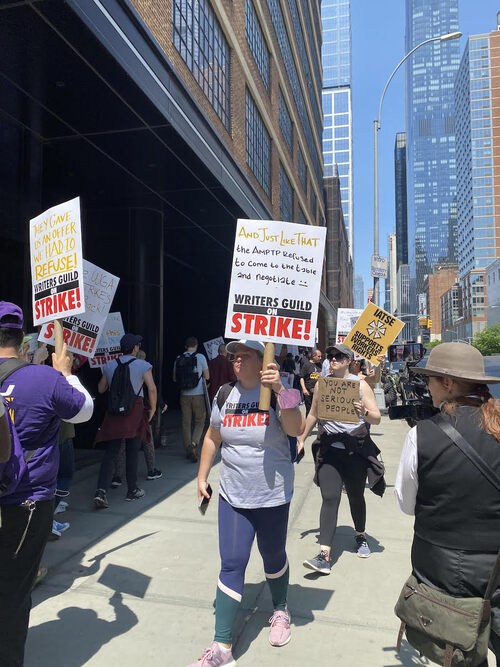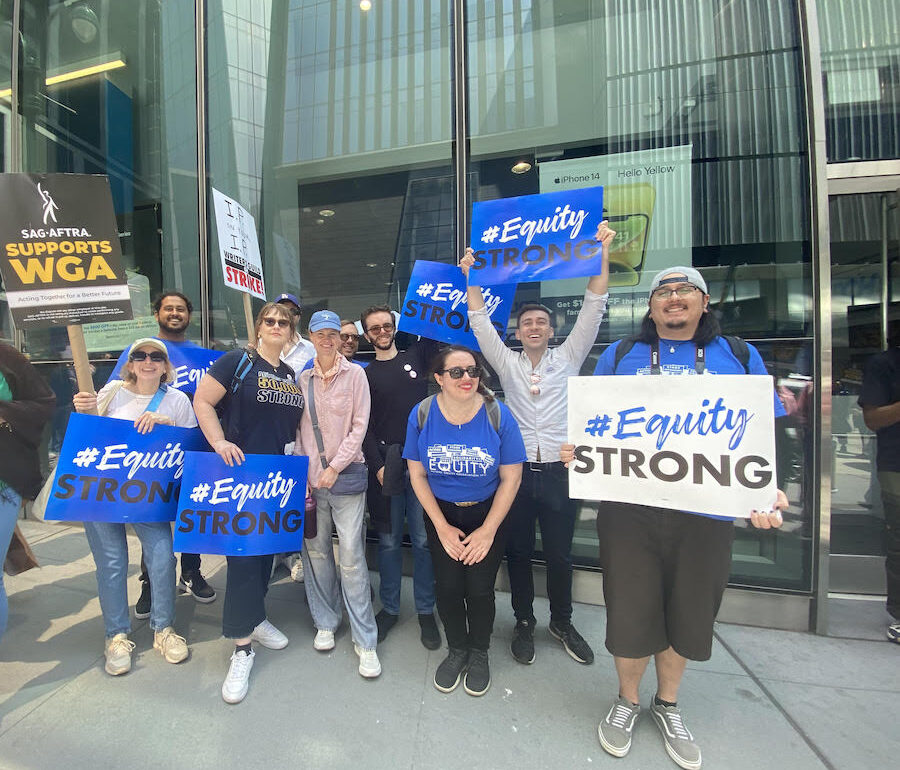It’s a common trope: Hollywood is where playwrights go to make a living. Theatre is where a writer can create a passion project, but TV is where a writer can make bank. Many playwrights thus join not only the Dramatists Guild for their theatre contracts, but also the Writers Guild of America (WGA), which has been on strike since May 2.
Quiara Alegría Hudes, a Pulitzer-winning playwright who wrote the book for In the Heights as well as the screenplay for the film adaptation, thinks that the idea that Hollywood offers financial stability to playwrights is more myth than reality.
“Right now I would say the particular state of both industries is that that is true for a very, very, very small percentage of writers in theatre and in film and TV,” she told me at a May 10 picket demonstration outside the Manhattan offices of HBO and Amazon Prime Video. “The most common experience, for new writers and for experienced writers, is that it’s a real scramble.”
The picket drew demonstrators from multiple arts and entertainment unions, including high-profile celebrities using their voices to call attention to the strike. (Hudes’s In the Heights partner Lin-Manuel Miranda, also a WGA member, passed out donuts.) Demonstrators joined writers to disrupt meetings, engender further public support, and shut down production on the Showtime series Billions, which had set up a location shoot nearby. Members of Actors’ Equity Association, the Screen Actors Guild – American Federation of Television and Radio Artists (SAG-AFTRA), the International Alliance of Theatrical Stage Employees (IATSE), and United Scenic Artists (USA) rallied to support striking writers and to look to the future; SAG-AFTRA faces their own negotiations with the Alliance of Motion Picture and Television Producers (AMPTP) next month, and sent a strike authorization vote to members last week.
As is the case in most strikes, the WGA is asking to bring up compensation for members up to meet rising costs of living. The television industry has not adapted residual compensation models to the streaming era, effectively leaving writers in the lurch while studios reap the streaming boom’s benefits. Last week, Disney announced that they are removing recent original titles from Disney+ and Hulu, and some writers have speculated that the move comes as a preemptive counter to the demand to pay streaming residuals.

“With the advent of streaming, our compensation has dropped dramatically,” Lisa Takeuchi Cullen, vice president of WGA East and a former journalist, explained at the picket. “Writers are paid by the week when we work on a television show, [and] the rooms are much shorter and smaller in size when they go to streaming. And the work that we do is the same.”
The theatre industry has long grappled with the question of streaming and live digital theatre, especially as the onset of COVID increased calls for on-demand streaming of filmed theatre productions. The politics of streaming theatre are complicated in part due to issues of copyright, which is one of the key factors that distinguishes the protections offered by the Dramatists Guild from those of the WGA: Playwrights own their work and screenwriters don’t. When I asked playwrights at the picket if they thought they could form their own union to protect them and collectively bargain with theatre producers, most believed that the issue of copyright would prevent such action.
“The studio is the author,” Christine Boylan said of the distinction between WGA contracts and Dramatists Guild ones. Boylan, a playwright who co-founded Bespoke Plays and wrote for the series Poker Face, among other shows, attended the May 10 picket in midtown. Boylan is grateful to have learned structure from playwriting, saying “the two disciplines teach each other,” but agrees with the received wisdom that Hollywood allows playwrights to finally earn a living wage—or at least that it used to.
Though cross-union solidarity was on full display at the picket, other theatre industry members have learned more about the WGA strike in connection to the Tony Awards. The show’s broadcast is scheduled for June 11, and the Tony Awards Management Committee filed an appeal to the WGA early in the strike to allow writers to work on the awards show regardless. WGA members and allies criticized the move, believing it would undermine the strike’s momentum and require writers to cross a picket line, while many theatre fans, performers, and journalists feared the impact the loss of the show could have on a still recovering Broadway. As Playbill noted, the American Theatre Wing has found ways to stage the ceremony during a strike before. Eventually the WGA announced on May 15 that they would not picket an altered form of the show (and today The New York Times had the story of how playwrights were central to this show-saving compromise). The move, which came after the committee issued a second appeal to the WGA, could solidify further camaraderie among arts unions in New York.
The arguments for and against granting the Tonys a waiver may have felt like a distillation of two separate but related issues. Volatility and vulnerability in the commercial theatre industry existed before the strike, and has little to do with the WGA’s demands either way; shows often announces May or June closures if they don’t rack up enough nominations or wins, and while a delayed or canceled ceremony could have further impacted shows on the cusp, this is not a new phenomenon. Shows that don’t win big next month are likely still to close, regardless of the brief but consuming media whirlwind around the awards show’s fate. The WGA is fighting for increased compensation and protections for writers in a notoriously difficult industry, while theatre artists also struggle to create their work in a landscape driven by profit and the perceived marketability of stories.
The conversation has been a delicate one: No one in the WGA took to the streets out of a desire to see theatre performers lose work. Arts and entertainment unions stayed quiet, aware that the potential bad press would fall on their opponents, not on them. (Though the Broadway League, which represents theatre owners and producers, does not wield the same power as the much-larger AMPTP, which represents studios, both sit across from unions at the negotiating table.) These unions represent artists at all levels, from celebrities to artists who work multiple jobs to pay off student loans and make ends meet. That the Broadway League would expect a full exemption for the Tonys, when they only agreed on a new contract with Equity for touring productions last month, smacked of hubris. The same group that fights against protections and compensation for lower-tier Equity members couldn’t expect a sister union like the WGA to simply roll over.

These nitty-gritty details, of course, don’t offer the glitzy image of the theatre industry that something like the Tony Awards projects. When I watched the Tonys in awe as a child, I thought that Broadway was the height of glamor and didn’t think about how many projects don’t come to fruition because artists need multiple jobs to survive. Contrary to the impression that some may give that the WGA strike is like summer camp for adults, as they slather on sunscreen and practice chants and songs and eat granola bars, a strike is not fun. It is anxiety-inducing and exhausting, and it is always a last resort.
“Honestly, they could end this strike today if they wanted to,” Boylan told me, referring to the AMPTP. Though this is by now an oft-repeated talking point, I have never yet heard it delivered without genuine emotion. “All they have to do is treat everybody fairly.”


